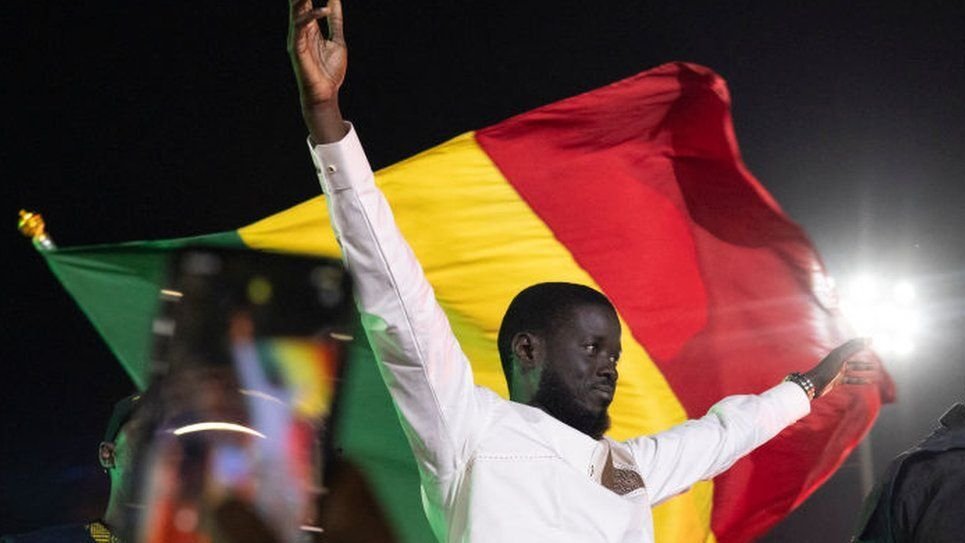Few knew of him a year ago, and now he’s poised to take the helm as president. Bassirou Diomaye Faye’s remarkable ascent marks a tumultuous period in Senegalese politics that caught many off guard.
Months spent behind bars alongside ally and influential figure Ousmane Sonko abruptly ended, with both released just a week before the presidential election.
Now dubbed Mr. Clean, he faces the task of implementing the sweeping reforms he has pledged.
“Methodical” and “modest” are often used to characterize the 44-year-old tax collector.
Mr. Faye fondly reminisces about his rural upbringing in Ndiaganiao, where he claims to return every Sunday to tend to the land.
His affection for and understanding of village life is matched only by his profound distrust of Senegal’s elites and established political order.
“He’s never held a ministerial position and lacks statesmanship, so critics raise concerns about his lack of experience,” remarks analyst Alioune Tine. “However, from Faye’s perspective, the insiders who have governed the country since 1960 have presided over some disastrous failures.”
Combating poverty, injustice, and corruption ranks high on Mr. Faye’s agenda. During his tenure at the Treasury, he and Mr. Sonko established a union task force to tackle graft.
According to Mr. Faye, negotiations regarding gas, oil, fishing, and defense contracts must prioritize the interests of the Senegalese people.
He champions an era of “sovereignty” and “rupture,” distinguishing his approach from the status quo, particularly in relation to ties with France.
The president-elect of Senegal pledges to replace the much-criticized CFA franc currency, which is pegged to the euro and supported by former colonial power France, with a new Senegalese or regional West African currency, though this transition won’t be without challenges.
“He will initially need to grapple with budgetary realities… but he appears to possess great ambition,” notes former Prime Minister Aminata Touré, who served under outgoing President Macky Sall.
Strengthening judicial independence and generating employment opportunities for Senegal’s sizable young population are also focal points for Mr. Faye—issues, Ms. Touré adds, that “President Sall largely ignored, to his detriment.”
She isn’t the sole political heavyweight to throw her weight behind the 44-year-old; former President Abdoulaye Wade did the same just two days before Sunday’s vote.
It’s a remarkable turnaround for Mr. Faye, who spent the past 11 months incarcerated on charges of insurrection, and many more years in the shadow of his ally.
‘Bassirou is me’ Bassirou Diomaye Faye emerged in February as the so-called “Plan B” candidate, stepping into the shoes of the charismatic opposition figure Ousmane Sonko. “I might even say he possesses more integrity than me,” proudly remarked Mr. Sonko.
Both men co-founded the now-defunct Pastef party; both are tax collectors, and both found themselves imprisoned last year on what they assert were politically motivated charges.
With Mr. Sonko convicted of two offenses, rendering him ineligible for the election, Mr. Faye assumed his position.
“Bassirou is me,” recently proclaimed Mr. Sonko to his supporters. “They are two sides of the same coin,” echoes Pastef colleague Moustapha Sarré.
Critics argue that Mr. Faye is merely a “default president.”
Not so, asserts analyst Mr. Tine. Nonetheless, the relationship between the two could signal a departure from conventional leadership styles.
“Perhaps they will establish a tandem and deviate from the hyper-presidential model characterized by an all-powerful head of state.
“Sonko is undoubtedly the undisputed leader of Pastef—a symbol, even… [yet] the two share a dynamic of complicity and collusion.”
Once upon a time, Mr. Faye harbored no political ambitions. “It never crossed my mind,” he reflected in 2019, reminiscing about his childhood.
One of Mr. Faye’s role models is the late Senegalese historian Cheikh Anta Diop, whose work is regarded as a precursor to Afrocentrism. Both are viewed as left-wing advocates for pan-Africanism.
As early results indicated Mr. Faye’s impending victory on Monday, residents of the capital, Dakar, celebrated by honking car horns and reveling to music.
The response from international markets was less enthusiastic, with Senegal’s dollar bonds declining to their lowest level in five months. Reuters reports that investors are apprehensive about Mr. Faye’s presidency potentially veering away from the country’s business-friendly policies.
Originally scheduled for last month, the election was postponed by Mr. Sall just hours before the commencement of campaigning, prompting deadly opposition protests and a democratic crisis.
Although most candidates had scant time to prepare once the new election date was set, Mr. Faye had just over a week after his release from incarceration.
Despite the truncated campaign period, Senegal’s citizens were resolute about turning out and exercising their right to vote, according to Christopher Fomunyoh of the National Democratic Institute for International Affairs, speaking to BBC Newsday.
“Senegal is demonstrating that democracies can self-correct and emerge stronger and more resilient.”




